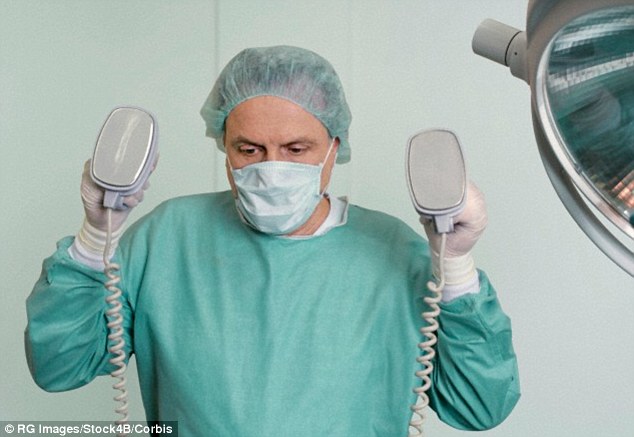

The study offers the possibility of one day preventing sudden cardiac arrest.
Cardiac arrest kills nearly 350,000 people in the US each year.
Though it’s commonly confused with a heart attack, cardiac arrest is different – and much worse.
It causes the heart’s electrical activity to be knocked out of rhythm, abruptly stopping it from beating.
CPR can buy time before an ambulance arrives, but few patients survive.
As a result it’s been hard for the medical community to tell whether cardiac arrest is a strike with little or no advance warning.
Scientists closely tracked sudden cardiac arrest in Portland, Oregon for more than a decade.
They examined records for nearly 1,100 people aged 35 to 65 who suffered a cardiac arrest between 2002 and 2012.
They also used interviews with family, friends and strangers who witnessed the patient’s collapse.
For around a quarter of patients, the scientists couldn’t find any information about whether they experienced symptoms – making it tough to say how common warning signs are.
However, of the remaining 839 patients, half had evidence of at least one symptom in the previous month.
Most of those people had symptoms within 24 hours of their collapse – though some came a week before and others up to a month.
Chest pain was the most common symptom in men. While women were more likely to experience shortness of breath.
Other symptoms included fainting and heart palpitations.
Furthermore, the study found that only a fraction of patients considered their symptoms bad enough to call 911 before they collapsed – and those people were the most likely to survive.
University of Pittsburgh emergency medicine specialist Dr Clifton Callaway, who wasn’t involved in the study but chairs the American Heart Association’s emergency care committee, said: ‘Chest pain, shortness of breath – those are things you should come in the middle of the night to the emergency department and get checked out.
‘We strongly recommend you don’t try to ride it out at home.’
WHAT ARE THE WARNING SIGNS?
Doctors at the Cedars Sinai Heart Institute in Los Angeles discovered half of all patients struck by sudden cardiac arrest did experience warning signs in the hours, days and even weeks before they collapsed.
In men the most common symptom was chest pain.
While female sufferers were more likely to experience a shortness of breath.
Other warning signs noted included fainting and heart palpitations.

The warning signs include shortness of breath for women and chest pain for men. Scientists said that if people go to the hospital when the symptoms appear, they may be able to save their lives and prevent cardiac arrest
A person’s chances of experiencing cardiac arrest is also increased if they’ve had previous heart attacks, coronary heart disease and certain inherited disorders that affect heartbeat.
People who know they are at a high risk may receive an implanted defibrillator to shock their heart back into rhythm.
But because cardiac arrest is such a public health problem, the Institute of Medicine kicked off a national campaign to teach CPR last summer, so that bystanders know how to help.
Dr Chugh and his team weren’t able to determine symptom severity.
The patients who called 911 about their symptoms were mostly already diagnosed with heart disease or had recurring symptoms.
Those patients’ survival rate was 32 per cent – compared to six per cent for other patients.
That’s because a fifth of the patients who called 911 had their cardiac arrest on the way to the hospital.
This study is just the start of more research to better predict the risk factors for cardiac arrest – and to figure out how to target them without panicking people – Dr Chugh said.
The study was published in Annals of Internal Medicine.
 |
 Are these the world’s scariest landing strips?
Are these the world’s scariest landing strips? In pics: Left behind children in China
In pics: Left behind children in China Eight modern day engineering marvels of China
Eight modern day engineering marvels of China Chinese beauty with sexiest bottom
Chinese beauty with sexiest bottom Charming female bodybuilders of Chengdu University
Charming female bodybuilders of Chengdu University Polish sports stars strip off for risqué calendar
Polish sports stars strip off for risqué calendar Spectacular aerial photos of the Three Gorges
Spectacular aerial photos of the Three Gorges Contestants of Mrs. Globe pose for photo in Shenzhen
Contestants of Mrs. Globe pose for photo in Shenzhen
 Bikini models attend hot pot banquet in Hefei
Bikini models attend hot pot banquet in Hefei Top 20 hottest women in the world in 2014
Top 20 hottest women in the world in 2014 Top 10 hardest languages to learn
Top 10 hardest languages to learn 10 Chinese female stars with most beautiful faces
10 Chinese female stars with most beautiful faces China’s Top 10 Unique Bridges, Highways and Roads
China’s Top 10 Unique Bridges, Highways and RoadsDay|Week